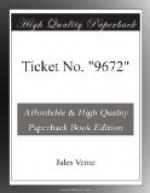“Patientia omnia vincit?”
CHAPTER III.
Without being very deeply versed in ethnography, one may be strongly inclined to believe, in common with many savants, that a close relationship exists between the leading families of the English aristocracy and the oldest families of Scandinavia. Numerous proofs of this fact, indeed, are to be found in the ancestral names which are identical in both countries. There is no aristocracy in Norway, however; still, though the democracy everywhere rules, that does not prevent it from being aristocratic to the highest degree. All are equals upon an exalted plane instead of a low one. Even in the humblest hut may be found a genealogical tree which has not degenerated in the least because it has sprung up anew in humble soil; and the walls are adorned with the proud blazons of the feudal lords from whom these plain peasants are descended.
So it was with the Hansens of Dal, who were unquestionably related, though rather remotely, to the English peers created after Rollo’s invasion of Normandy, and though rank and wealth had both departed they had at least preserved the old pride, or rather dignity, which becomes all social ranks.
It was a matter of very little consequence, however. Whether he had ancestors of lofty lineage or not, Harald Hansen was simply a village inn-keeper. The house had come down to him from his father and from his grandfather, who were widely known and respected, and after his death his widow continued the business in a way that elicited universal commendation.
Whether or not Harald had made a fortune in the business, no one was able to say; but he had been able to rear his son Joel and his daughter Hulda in comfort; and Ole Kamp, a son of his wife’s sister, had also been brought up like one of his own children. But for his uncle Harald, this orphan child would doubtless have been one of those poor creatures who come into the world only to leave it; and Ole Kamp evinced a truly filial devotion toward his parents by adoption. Nothing would ever sever the tie that bound him to the Hansen family, to which his marriage with Hulda was about to bind him still more closely.
Harald Hansen had died about eighteen months before, leaving his wife, in addition to the inn, a small farm on the mountain, a piece of property which yielded very meager returns, if any. This was especially true of late, for the seasons had been remarkably unpropitious, and agriculture of every kind had suffered greatly, even the pastures. There had been many of those “iron nights,” as the Norwegian peasants call them—nights of north-easterly gales and ice that kill the corn down to the very root—and that meant ruin to the farmers of the Telemark and the Hardanger.
Still, whatever Dame Hansen might think of the situation of affairs, she had never said a word to any living soul, not even to her children. Naturally cold and reserved, she was very uncommunicative—a fact that pained Hulda and Joel not a little. But with that respect for the head of the family innate in Northern lands, they made no attempt to break down a reserve which was eminently distasteful to them. Besides, Dame Hansen never asked aid or counsel, being firmly convinced of the infallibility of her own judgment, for she was a true Norwegian in that respect.




